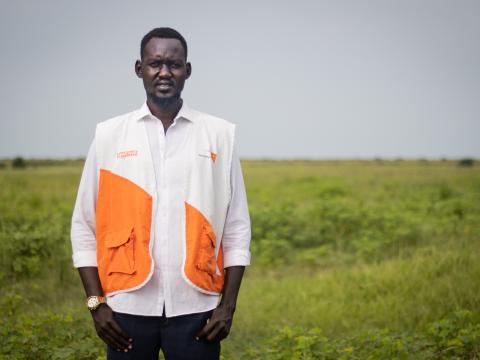Chidong Tuel: The force behind my work in South Sudan’s difficult locations

The job is physically exhausting, but every time I see a mother breastfeeding her malnourished child, I immediately forget my own problems.
I have been World Vision’s Food Monitor for the Rapid Response Mechanism (RRM) Program since 2018 and is stationed in South Sudan’s hard-to-reach locations, along with the 28 members of the team.
I was once in-charge of the program’s Scope System and ensures that the equipment is secure and working, the data is updated and food vouchers are ready for the next distribution. When COVID-19 ended the project, I supported the food distribution.
The rainy season is the most challenging for this kind of work, when the already swampy areas will be flooded with water and deep in mud.

One time in a place call Ngueny the team spent 14 days trying to find a shallow place to set the drop-zone for the food that will be airdropped.
We found one covered by tall grasses and we started to cut and clear the overgrown area, keeping alert of dangerous animals hiding in the overgrowth. Three planes dropped the food on the same day, requiring us to work late soaking wet.
It is unbelievable how the team can maneuver through snakes and frogs lurking all over the drop zone areas. Some of these reptiles also scamper surprised from dropping bags from the planes.
There were times we were chased by the bees in the trees when we are trying to recover the sacks that fell on them. We know being bitten can have deadly consequences.

Last year, we went for a food distribution assignment in Maker, a village which is part of Nassir County in Upper Nile State. A woman told me how she lost all her food when the makeshift carrier capsized in the water.
It is unbelievable how the team can maneuver through snakes and frogs lurking all over the drop zone areas. Some of these reptiles also scamper surprised from dropping bags from the planes.
The women often build this innovative transport through the river to help them carry heavy bags of food ration. As there was no other choice, they have to find a way to ward off alligators and strong currents.
I was disturbed by her story as losing the food means she has to wait for the next distribution. These are moments when you need to go through their pain and feel helpless that there is nothing you can do.
Teamwork is the best formula for this humanitarian work in this difficult environment. It has to be done together. Faster, and more, hands make work efficient.
Being a part of the RRM team has been my best experience at work so far. Despite the danger and the tough conditions, it feels like adventure to me. I have learned much outside of my degree in Information Technology (IT).

Growing us as a child in Khartoum, I was so obsessed with lights, electronics and television. When we went back to South Sudan (then we called Southern Sudan) my life completely changed. Our electricity came from a generator which can only runs for few hours.
This limited my opportunity to watch my favorite TV shows as they switch it off early to save fuel. This bothered me enough to dream of taking an electrical engineering degree so I can finds ways for our house to have enough electricity for as long as we need it.
I even took vocational short courses on electrical work and learned to do wiring and simple connection work. I ended up taking an IT course and I think am still in the same road though some different voyage.
World Vision’s Rapid Response Mechanism (RRM) Project in partnership with the World Food Programme (WFP) supports 193,131 internally-displaced people during the lean season living in the most remote corners of South Sudan’s three counties in 19 different locations.

Chidong Tuel, 31 years old is RRM’s Food Monitor and hails from Mayiandit County of South Sudan’s Unity State.